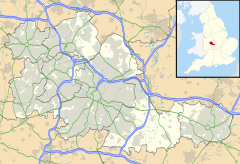Tettenhall
| Tettenhall | |
|---|---|
| Tettenhall shown within the West Midlands | |
| Population | 5,225 (2001 Census) |
| Metropolitan borough | |
| Metropolitan county | |
| Region | |
| Country | England |
| Sovereign state | United Kingdom |
| Post town | Wolverhampton |
| Postcode district | WV |
| Dialling code | 01902 |
| Police | West Midlands |
| Fire | West Midlands |
| Ambulance | West Midlands |
| EU Parliament | West Midlands |
| UK Parliament | |
Tettenhall (previously known as Totehala and Totenhale and Pronounced Tett-Null) is a historic village within the city of Wolverhampton, England. The name Tettenhall is probably derived from Teotta's Halh, Teotta being a person's name and Halh being a sheltered position. Tettenhall only became part of Wolverhampton in 1966, along with Bilston and Wednesfield.
The Battle of Tettenhall in 910 was the turning point in the battle against the Danish Viking invaders by the united forces of Edward the Elder of Wessex and Ealdorman Æthelred of Mercia. It saw the crushing defeat of the last of the large Danish Viking armies to ravage England, including the deaths of the Danish Kings, Eowils and Healfdan. In more recent times, the north part of the village became known as "Danescourt".
The original "Teotta's Halh" was likely situated in the sheltered area below the ridge where the Church stands. This area, around Lower Green, was the original inhabited area of Tettenhall. In early English (Anglo-Saxon) times, as the place name evidence tells us, there were many cleared woodland areas - areas where field and settlement would have been commonplace. These can be seen today by the place name ending "ley", from early English "lēah", meaning woodland clearing; Wrottesley being one such example in the local area. Where most of the land was wooded, below the ridge ran, as it does today, the river Smestow - though at this time, it was a larger stream than it is today, running through extensive marshy ground.
Tettenhall has an old parish church, St Michael and All Angels, located at the base of the ridge, leading off Lower Green. An exact founding date for it is not known, though records of a fourteenth-century dispute over village land tell us that the church had been founded during the reign of King Edgar - some point between 959 and 975AD. The Domesday Book of 1086 informs us that before the Norman conquest, Tettenhall was held by three Englishmen - Hunta, Wulfstan and Godwin. Of course as with the majority of England, post conquest, William the Conqueror gave the land to his followers.
...
Wikipedia

